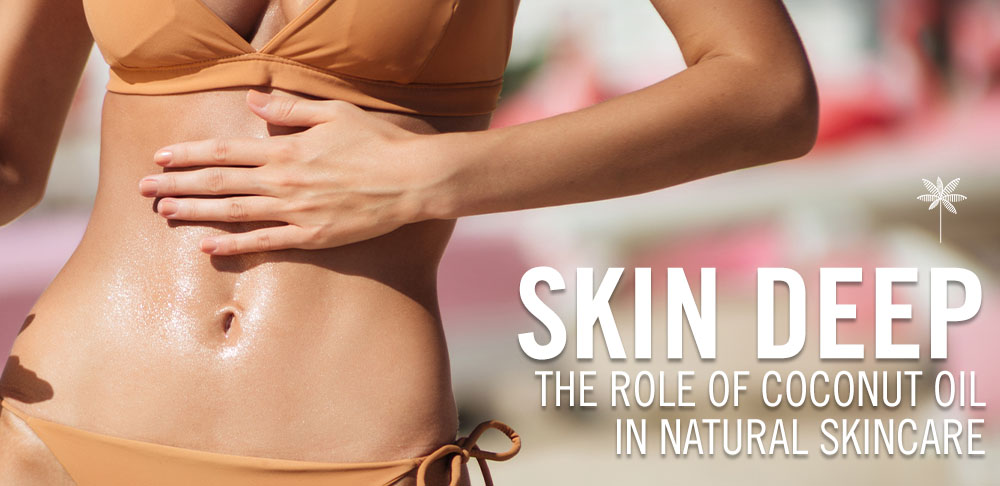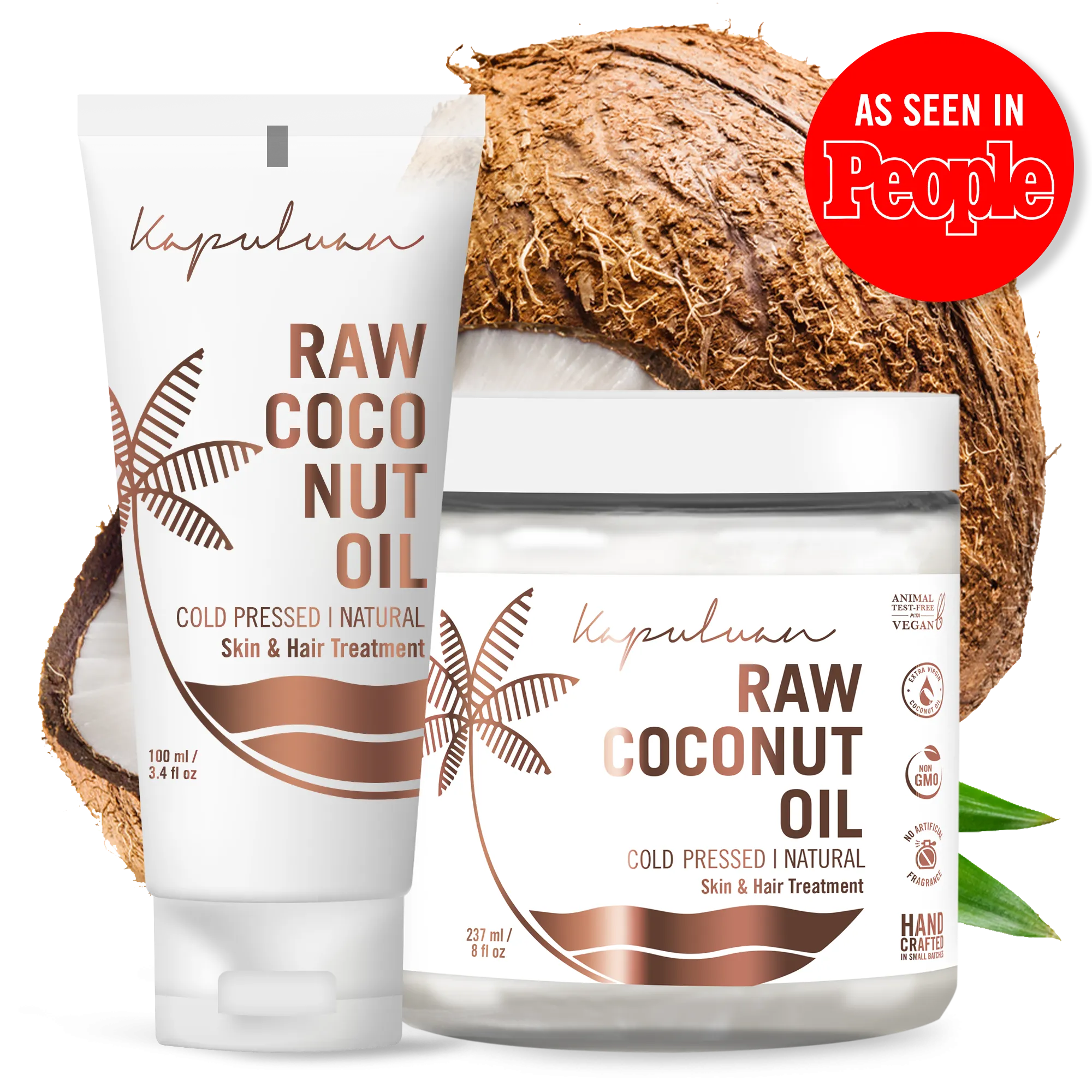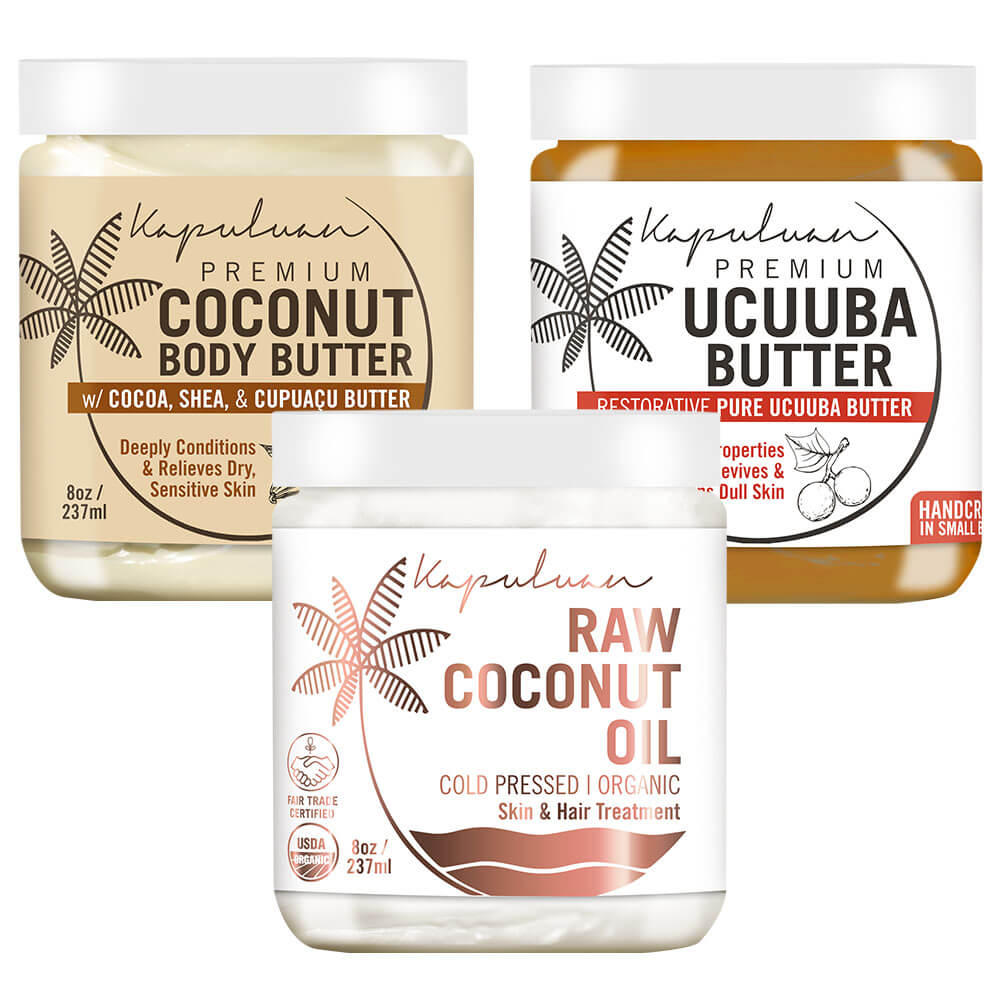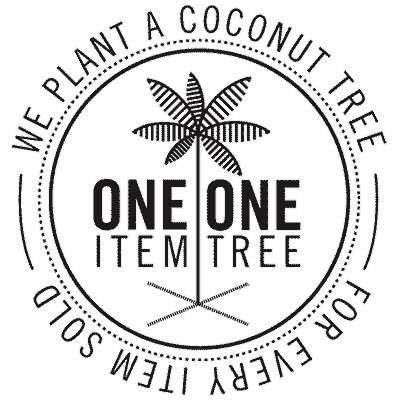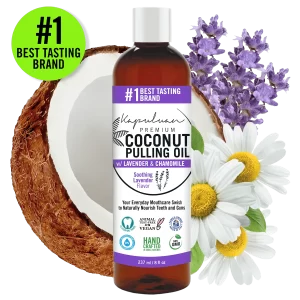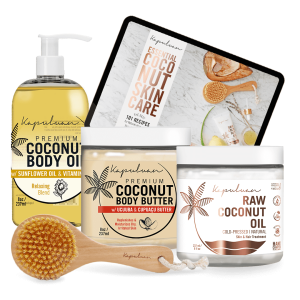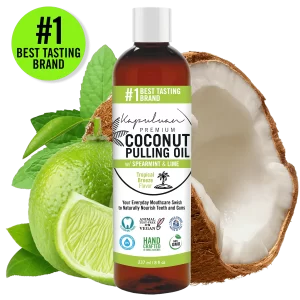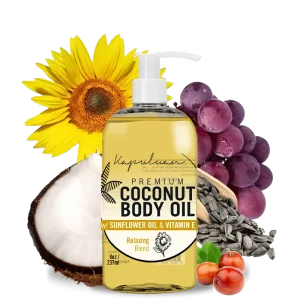Did you know that the global market for coconut oil is expected to reach a staggering $8 billion by 2025? That’s no surprise to us, as we’ve been singing its praises in natural skincare for years. We’re here to take you on a deep dive into the world of this miracle ingredient, exploring its rich history, nutritional composition, and undeniable benefits.
We’ll also delve into how coconut oil stacks up against other natural oils and address common concerns related to its use. No matter what your skin type or concern may be, we believe there’s a place for coconut oil in your routine. Don’t let the mystery of this tropical treasure hold you back from achieving radiant, healthy skin—it’s time to break free and discover the power of nature’s bounty at your fingertips!
Historical Usage of Coconut Oil
You’ve probably heard the old saying, ‘there’s nothing new under the sun,’ and when it comes to
coconut oil’s role in skincare, it’s as true as gospel. The
history of coconut oil dates back thousands of years, with evidence of its use etched in the annals of ancient civilizations across Asia and the Pacific Islands. Its cultural significance cannot be overstated; for these cultures, coconut oil was more than just a skincare product—it played a pivotal role in spiritual rituals, food preparation, medicine, and even commerce.
The extraction methods used to obtain coconut oil were simple yet effective. Our ancestors would crack open coconuts and leave them to dry under the sun. Once dried out—the process called “copra”—the meaty part would then be pressed or boiled to extract the precious oil. This traditional method ensured that all vital nutrients remained intact within the oil—nutrients fundamental to skin health, such as antioxidants and essential fatty acids.
As we delve further into our exploration of natural skincare solutions like coconut oil, we’re not simply looking backward—we’re also forging ahead toward a future where nature’s offerings are valued above synthetic alternatives. True freedom lies here: acknowledging our roots while embracing innovation that respects Mother Nature’s wisdom. So let’s continue this journey together—with each application of
organic coconut oil on our skin, we honor both past traditions and embrace a future guided by holistic wellness principles free from harsh chemicals or artificial additives.
Nutritional Composition and its Benefits
It’s astounding to consider the bounty of nutrients packed into that humble, hard-shelled fruit and how they can transform our health and beauty! Coconut oil is rich in medium-chain fatty acids (MCFAs), which are easier for our bodies to digest and convert into energy than their long-chain counterparts. It also contains lauric acid, a compound with potent antimicrobial properties that can help keep your skin clear and healthy. Moreover, coconut oil is abundant in vitamin E, a powerful antioxidant that protects your skin from free radical damage. The extraction method used to obtain the oil also plays a significant role in its nutrient composition; cold-pressed virgin coconut oil retains more beneficial compounds than its
refined counterpart.
The nutritional composition of
coconut oil has dietary implications and direct benefits for skincare. The MCFAs present offer excellent moisturizing effects, while lauric acid acts as an antibacterial component for treating acne-prone skin. On top of that, the antioxidant-rich Vitamin E content aids in preventing premature aging by fighting off harmful radicals. Check out this table below to get a better grasp on what exactly resides within this miraculous fruit:
| Nutrient |
Benefit |
| Medium Chain Fatty Acids (MCFAs) |
It provides deep hydration & easy digestion |
| Lauric Acid |
Acts as an antibacterial agent |
| Vitamin E |
Protects against free radical damage |
Unraveling these facts about coconut oil brings us closer to understanding why it has been revered across cultures for centuries—its power goes far beyond cooking or hair care! This versatile gift from nature allows us to explore natural solutions without needing an arsenal of products or complicated routines. With every application on our skin, we’re tapping into centuries-old wisdom while nourishing ourselves with pure goodness from Mother Nature! So here’s to embracing natural skincare – let’s continue exploring how to harness the magic of a simple coconut.
Applications in Cosmetic Industry
There’s no denying this tropical wonder has utterly smitten the beauty world, and its use in cosmetic products is as widespread as the ocean. Coconut oil is prominent in natural skincare due to its amazing moisturizing properties, antibacterial nature, and gentle detoxifying effects. It’s been embraced wholeheartedly not just for its skin benefits but also for its eco-friendliness – a virtue that aligns with the rising consumer consciousness about sustainability.
The applications of coconut oil in the cosmetic industry are numerous:
- It forms the creamy base in many body lotions and face creams.
- As an ingredient in ‘Coconut Oil Lipsticks,’ it imparts smoothness and keeps lips hydrated.
- In hair care products, it provides deep nourishment and promotes healthy growth.
- It’s even used in sustainable packaging innovations; biodegradable containers made from coconut shells are becoming increasingly popular.
Moreover, while shifting towards more natural skincare regimes can feel overwhelming at first – deciphering ingredient lists or choosing between brands – knowing coconut oil can be trusted makes things easier. It’s like finding a true ally amidst all those hard-to-pronounce ingredients. And what could be more freeing than knowing you’re caring for your skin with something pure, potent, yet gentle? So go ahead, let your skin drink up all the goodness of this tropical marvel. Remember that every time you choose a
product with coconut oil over synthetics or opt for sustainable packaging innovations, you are casting a vote for healthier skin and a happier planet.
Impact on Different Skin Types
Just as a tropical breeze feels different on various landscapes, the effects of this wonder ingredient can vary across diverse complexion types. Coconut oil’s Oil Absorption Rate is one factor that determines its impact on your skin type. It absorbs quickly into the skin, providing instant hydration without leaving an oily residue. However, people with naturally oily or acne-prone skin may find it too heavy and potentially pore-clogging.
When we delve deeper into the Hydration Effects of coconut oil, we see how it works wonders for dry and combination skin types. The fatty acids present in coconut oil help reinforce the skin’s natural lipid barrier, promoting hydration and elasticity. This aids in locking moisture into the skin, which can smooth out fine lines and give your face a healthy glow. For those with sensitive skin, coconut oil has soothing properties that can reduce inflammation and irritation.
We must also consider that each individual’s experience with coconut oil will be unique based on their specific skincare needs and reactions to natural products. So while some may bask in its benefits, like sun-warmed sand underfoot at a beach escape, others might need to mix it up by using it sparingly or combining it with other oils for optimum effects. As always, when dealing with skincare, listening to your body is key – like following your heart toward freedom!
Addressing Common Skin Concerns
Addressing common skin concerns, you’ll find that this magical ingredient has the potential to transform your complexion. For instance, consider a scenario where you’re battling persistent dry patches; regular application of this tropical elixir can provide intense hydration, leaving your face smooth and supple. Not just that, coconut oil’s anti-inflammatory properties make it a potent remedy for various skin allergies too. It’s packed with soothing compounds like lauric acid, which helps calm irritated skin and reduce redness.
To elaborate on the
versatility of coconut oil in addressing common skin issues, let’s take a look at the following table:
| Skin Concern |
How Coconut Oil Helps |
| Dry Skin |
Intensely moisturizes and hydrates |
| Acne |
Antibacterial properties help fight acne-causing bacteria. |
| Skin Allergies |
Soothes inflamed skin and reduces redness |
| Aging |
Nourishes the skin and slows down signs of aging |
Moving on to acne treatments, did you know coconut oil is teeming with antibacterial properties? Yes! The lauric acid found in it is known for its ability to kill harmful microbes that cause acne. We feel it’s important to note that while some people may find success using coconut oil as part of their acne treatment regimen, others may not enjoy the same results due to individual skin types and sensitivities. Doing a patch test before starting any new skincare routine involving coconut oil is always best.
So there we have it: an overview of how this simple yet powerful natural resource can be used as an effective tool against many common skincare woes. Whether you’re looking for relief from persistent dryness or trying out natural remedies for treating acne or allergies, taking advantage of what nature offers us freely – like coconut oil – could lead us into a new era of healthy, radiant complexions. Let’s embrace what Mother Nature provides us – her gifts are limitless if we dare to explore them!
Comparing with Other Natural Oils
Now, let’s shift gears and dive into a comparison with other botanical elixirs you might have heard about in the beauty world. When comparing coconut oil to its counterparts, such as jojoba oil, argan oil, or olive oil, there are several important aspects to consider. These include Oil Extraction Methods, which can significantly affect the quality of the final product. For example, cold-pressed oils preserve more nutrients than those extracted using heat or chemicals. It’s also essential to consider possible Allergic Reactions; while coconut oil is generally safe for most
skin types, some people may find they’re sensitive to it.
- Jojoba Oil: This natural extract is similar to our skin’s sebum, making it a great moisturizer that doesn’t clog pores.
- Argan Oil: Known as ‘liquid gold,’ this precious elixir is rich in fatty acids and vitamin E, providing excellent hydration and anti-aging benefits.
- Olive Oil: Has been used since ancient times for skin care due to its antioxidants and hydrating squalene.
- Coconut Oil: This tropical treasure stands out due to its high content of lauric acid, famous for its antimicrobial properties.
Don’t get us wrong – all these oils have unique charms and benefits when incorporated into your skincare routine. Still, coconut oil does stand out thanks to its versatile nature and affordability. Unlike some exotic oils that can be quite pricey or hard to find,
coconut oil is readily available and budget-friendly without compromising quality or effectiveness. Plus, with no known widespread allergic reactions linked with its use, it’s a safe bet for almost everyone seeking freedom from artificial additives in their skincare products! So why not embrace nature’s power today by trying coconut oil? You might just be surprised at how much your skin will love it!
Scientific Evidence Supporting its Use
Let’s get real, shall we? You’re probably wondering if there’s any solid science backing up all this hype about tropical elixirs, right? Well, it’s not just about coconut oil looking good on your bathroom shelf. There’s a wealth of
research supporting the beneficial effects of coconut oil in natural skincare. For starters, its unique fatty acid composition is known to have potent anti-inflammatory properties. This means that coconut oil can help soothe irritated skin and reduce redness – something we all yearn for when our skin decides to throw a tantrum!
In addition to calming inflammation, coconut oil boasts an impressive antimicrobial function. It contains lauric acid – a medium-chain fatty acid scientifically proven to kill off harmful microorganisms on the skin’s surface. So while you’re slathering this tropical treat onto your face or body, know that it’s diligently working behind the scenes to keep those pesky blemishes at bay! Remember though – as with everything else in life, moderation is key here too.
Many studies have supported these claims and investigated how this white gold works its magic on our skin. Scientists believe the combination of anti-inflammatory properties and antimicrobial function make coconut oil highly effective for skincare purposes. Moreover, its ability to deeply penetrate the skin layers and deliver hydration where needed most is another feather in its cap! So next time your skin craves relief from irritation or dryness, don’t hesitate to reach out for your jar of pure goodness – because science approves!
Practical Tips for Incorporating into Routine
Having explored the scientific evidence that supports the use of coconut oil for natural skincare, we’re now able to delve into practical ways you can incorporate this tropical marvel into your daily routine. Armed with knowledge, freedom lies in taking control of our skincare and using ingredients that not only nourish our skin but also align with our values. So, let’s plunge into making coconut oil a staple in our personal care regimen.
A fantastic place to start is with a
coconut oil massage.
Pure and unrefined organic coconut oil works wonders as a massage oil due to its deeply moisturizing properties and pleasant aroma. It doesn’t just soften the skin – it’s also known for its ability to remove dead skin cells, making way for renewed growth. To enjoy these benefits, warm up some coconut oil until it melts (solidifies at lower temperatures), then gently massage it onto your skin. After showering, you can do this on your face or body when your pores are open and more receptive to absorbing nutrients.
Moving on from massages, DIY coconut skincare offers endless possibilities! Creating homemade face masks using coconut oil and other natural ingredients such as honey or oats is an effective way to customize treatments tailored to your skin needs. This isn’t limited to face masks either; consider using it as an overnight hair treatment or hand cream – there’s so much flexibility here! The beauty of embracing natural skincare like this lies in improved complexion and the freedom gained from knowing exactly what’s going onto your skin while saving money on expensive commercial products simultaneously.
